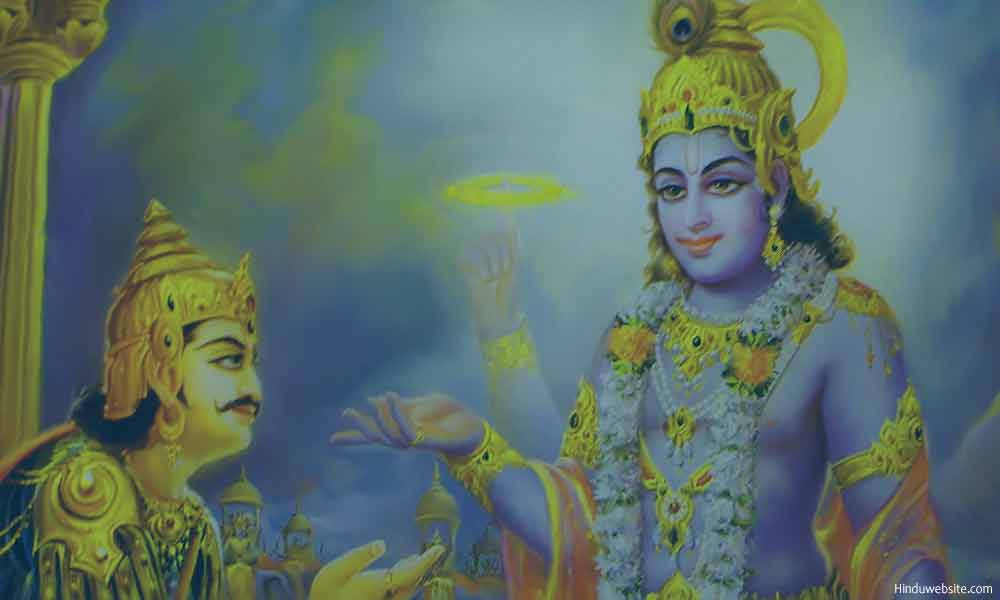
What is the Meaning of Bhagavadgita?

Notes: I have translated the Bhagavadgita twice. The first one was a loose translation. The second one was a word to word translation with a detailed commentary. The commentary is however different from what you will find here. In this section I will share with you my thoughts about the knowledge, philosophy and wisdom of the Bhagavadgita as I understand it from my perspective. Jayaram V
There are multiple meanings to Bhagavadgita. We will examine them in this discussion. The word "bhagavadgīta" is popularly translated as the song of God, or the celestial song. Gītam means both a song and an act of singing or chanting. It also means what is told, declared or chanted, which is usually a reference to a sacred writing, transmitted knowledge, a religious conversation or a spiritual dialogue. In Hinduism, there are many Gītas, such as Shivagīta, Ramagīta, Astavakragīta, Avadhutagīta, Devigīta etc. They are named after the names of the deities or the teachers who are their source.
However, traditionally the Bhagavadgīta is the most popular among them most likely because of its content and association with Lord Krishna and the Mahabharata. Because of its popularity it has been placed on par with the Upanishads and the Brahma sutras. Together they are considered the sacred triad (prastanatraya).
Bhagavadgita literally means a song or a discourse of the Bhagavat, meaning God or a self-realized spiritual teacher. Bhagavat also means a worshipper or devotee of God or one who renders selfless service to other devotees as an offering to God. In the Bhagavadgita, Arjuna represents a bhagavata. He was a friend and devotee of Lord Krishna. Strictly speaking, there is no distinction between God and his truest devotees (bhagavatas). They are connected inwardly and experience the same consciousness, even when they are apart.
Thus, in a broader sense, Bhagavadgita is a song or a discourse by the Bhagavat or God for the bhagavatas or his devotees. Its purpose is to enlighten them and help them to attain liberation. According to Vaishnava beliefs, after their liberation the Bhagavatas (worshippers of Vishnu) live in the immortal world of Vishnu, in the golden and emerald city of Vaikuntha, from where they never return and never take birth again. Some people prefer to worship Krishna only and avoid any reference to Vishnu, since they believe Krishna is the true Bhagavat and the lord of Vaikuntha.
What is so special about the Bhagavadgita? You may consider it a treatise on the subject of liberation. It deals with the various approaches to achieve liberation and aptly integrates them into a holistic, transformative wisdom, which can be practiced by worldly people who are engaged in their householder duties and by ascetic people who renounce the world to find the Self within them, laying equal emphasis upon duty, knowledge, devotion, detachment, virtue or purity and renunciation in the practice of various yogas.
Suggestions for Further Reading
- The Wisdom of the Bhagavadgita, Main Page
- The Wisdom of the Upanishads, Main Page
- The Bhagavad-Gita Essays and Translations
- An Introduction To The Bhagavad-Gita And Its Three Secrets
- Why to Study the Bhagavadgita Parts 1 to 4
- The Abbreviated Bhagavadgita
- The Problem of Maya Or Illusion and How To Deal With It
- The Problem of Maya Or Illusion and How To Deal With It
- The Bhagavadgita, Philosophy and Concepts
- The Many Gods and Goddesses of Hinduism
- Divine Qualities Of A True Worshipper Of God
- The Bhagavadgita on Karma, the Law of Actions
- Maya, The Grand Illusion Or The Delusion Of The Mind
- Aspects, Emanations, Incarnations and Forms of God Vishnu
- Dvaita or Advaita What is the Truth?
- Symbolism in the Bhagavadgita
- The Truth About Karma
- Meaning and Definition of Bhagavan
- Brahman the Supreme Universal Lord of All
- What is Bhakti or Devotion?
- Bhakti Marg, the Path of Devotion
- History and information about Mathura and Vrindavan Temples
- True Devotion and Qualities of a True Devotee
- Essays On Sorrow And Its Spiritual Significance
- The Yoga of Knowledge or the Samkhya Yoga, Verses and Commentary by Jayaram V
- Essays On Dharma
- Esoteric Mystic Hinduism
- Introduction to Hinduism
- Hindu Way of Life
- Essays On Karma
- Hindu Rites and Rituals
- The Origin of The Sanskrit Language
- Symbolism in Hinduism
- Essays on The Upanishads
- Concepts of Hinduism
- Essays on Atman
- Hindu Festivals
- Spiritual Practice
- Right Living
- Yoga of Sorrow
- Happiness
- Mental Health
- Concepts of Buddhism
- General Essays